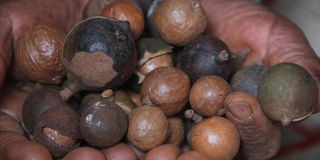Firms find macadamia smuggling syndicate a hard nut to crack

A farmer holds Macadamia nuts after harvesting at Kariguini village in Nyeri county. With the advent of the picking season in Mt Kenya region, concerns have emerged that cartels could erode the gains made over the past four years in reviving the Sh2 billion industry. FILE PHOTO | JOSEPH KANYI
What you need to know:
- Shadowy dealers keep changing their business names and evading taxes to cover their operations.
- The arrest of seven Chinese merchants in Meru last week has sparked protests from farmers and politicians.
- Farmers claimed the Chinese were buying the nuts for Sh120 per kilogramme, while local processors were parting with only Sh70 and Sh80 for the same quantity.
Local nut processors are up in arms over resurgence of cartels that are smuggling raw macadamia to China through Tanzania.
Nut directorate head Raymond Kahindi confirmed this, adding that surveillance has been increased while allowing market forces to dictate farm gate prices.
“We have set up surveillance teams at all border points to curb smuggling of raw nuts, which are taking away our jobs,” Mr Kahindi told the Sunday Nation.
With the advent of the picking season in Mt Kenya region, concerns have emerged that cartels could erode the gains made over the past four years in reviving the Sh2 billion industry.
During this period, production of macadamia rose from 18,000 to 35,000 tonnes while the number of licensed processors increased from nine to 25.
But the interception of a consignment of raw nuts at Namanga border point two weeks ago, and raw cashew nuts at Lunga Lunga last week, have shown that the industry is not out of the woods yet.
“Smuggling of macadamia nuts is still rife. Statistics by the International Nuts Council show Tanzania is exporting 3,000 tonnes annually of in-shell macadamia yet the country is not a producer,” said Nut Processors Association of Kenya head Charles Muigai in a February 28 letter to the Kenya Revenue Authority.
The letter urged investigators and the enforcement department to ascertain the compliance status of the firms involved in the racket and to check all goods heading to southern border points.
According to Mr Muigai, shadowy dealers keep changing their business names and evading taxes to cover their operations.
But the arrest of seven Chinese merchants in Meru last week has sparked protests from farmers and politicians. Farmers claimed the Chinese were buying the nuts for Sh120 per kilogramme, while local processors were parting with only Sh70 and Sh80 for the same quantity.
Police requested the court to allow them to hold the suspects at Meru Police Station for five days as investigations continued. The seven are accused of being in the country illegally, engaging in business without permits and dealing in export of prohibited raw products.
The ban on exportation of unshelled macadamia and cashew nuts was issued in 2009 to create more jobs locally. China is said to be giving rebates on imported shell nuts.
Smuggling cartels reportedly use Thika town as their main consolidation and warehouse point. Racketeers also operate depots illegally. The nuts are loaded onto trucks at Mlolongo and Kiang’ombe then ferried to Namanga and other border points.
Although local processors have a combined capacity of 80,000 tonnes a year, production stands at 45,000 tonnes. The processors have also written to the director-general of Agriculture and Food Authority seeking action on the cartels.
Mr Muigai denies that local processors are uncomfortable with the high prices offered by Chinese merchants.
“You cannot prevent anybody from buying macadamia,” he said, adding that local processors were buying the nut at the same price.
Measures that processors are proposing to contain the smugglers include proper coordination between the Agriculture and Food Authority and county governments in vetting macadamia movement.




